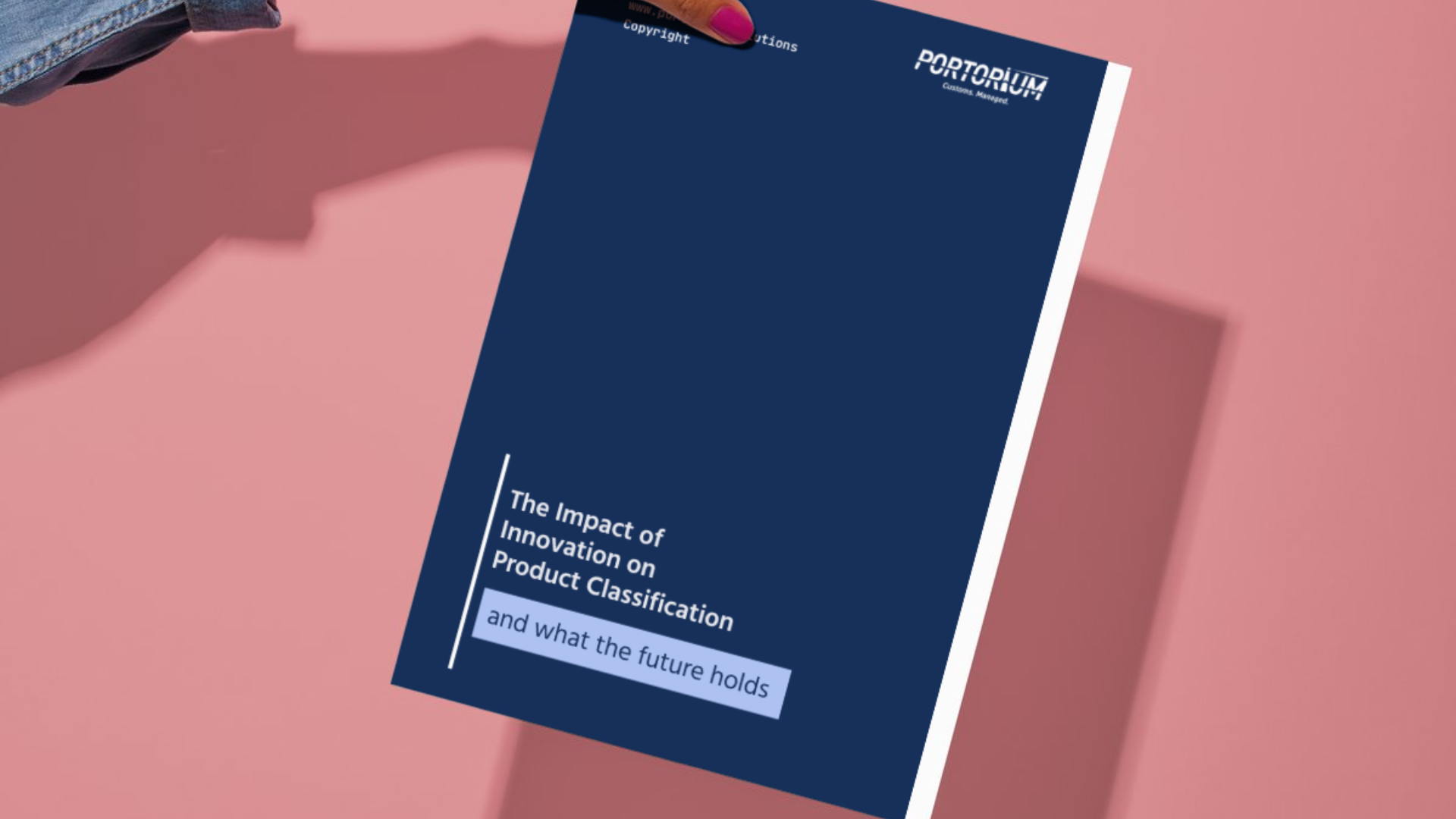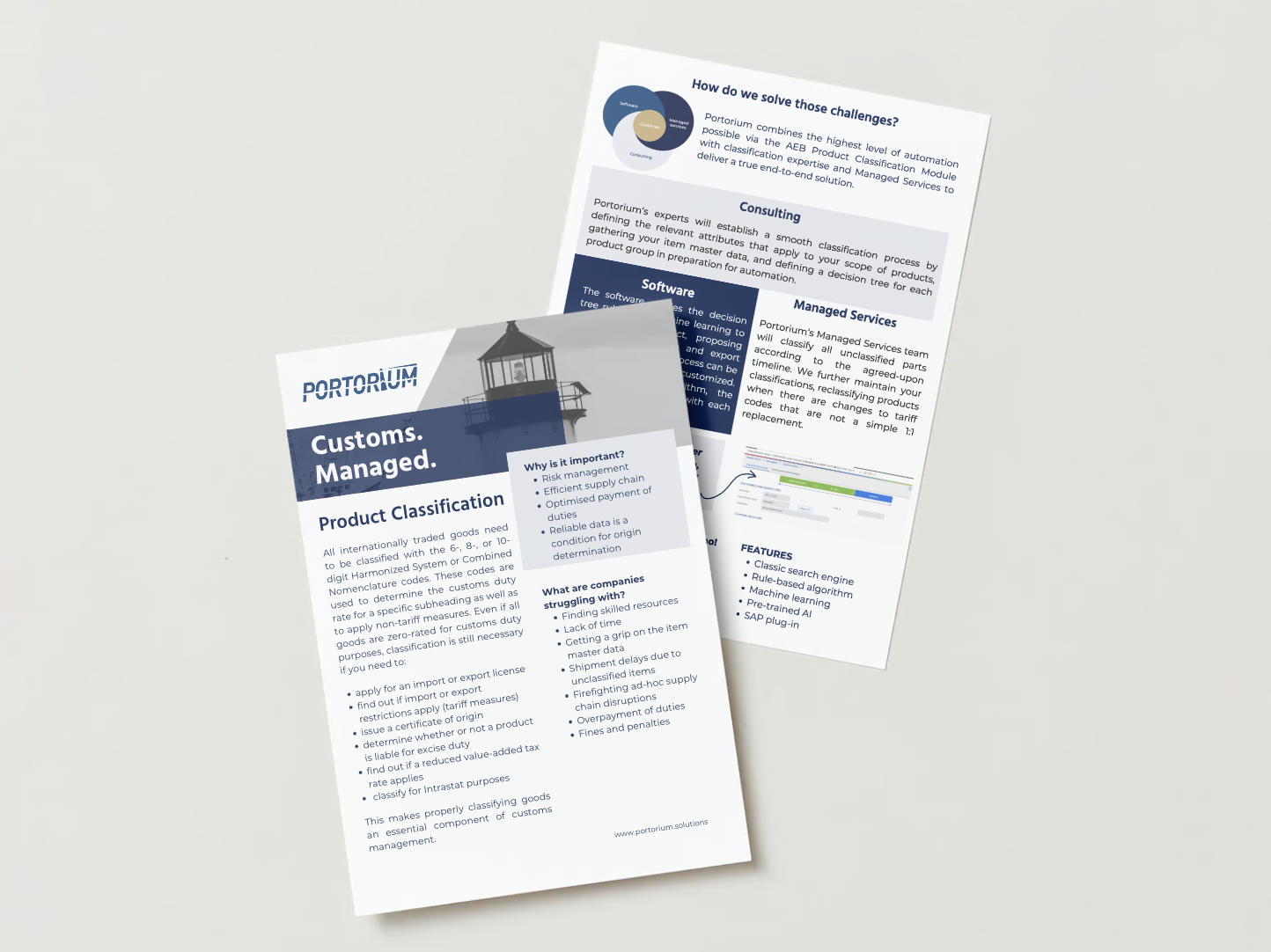Portorium is now a part of AEB
Product classification
Automated classification with expert validation
Avoid declaration errors, unforeseen customs duties, penalties, and border delays. Portorium supplements automated, AI-driven import and export classification with review and verification by customs experts.
Why is proper classification important?
- Risk management
- Efficient supply chain
- Optimised payment of duties
- Reliable data is a condition for origin determination
Tariff classification
Tariff classification associates the correct commodity codes for articles accompanied by customs declarations. The correct classification code determines duty rates and tariff measures that must be declared in customs declarations as well as rules of origin. Incorrect tariff codes may attract additional customs duties and penalties.

Use case: Curing complex classification problems
A life sciences company was having difficulty classifying parts contained in their end product, with tens of thousands of components not properly classified.
Results:
- Automated classification
- Continuous improvement of automation
- Expert review of exceptions without new FTEs
Do you want to see how quickly you can classify your goods with pre-trained AI?
Trade measures
Trade measures are the legal provisions that relate to licenses and prohibitions for the import or export of goods. These must be identified by specific document codes in customs declarations. Terms such as quotas and technical regulations vary from country to country and may change with emerging trade restrictions or agreements.

Use case: Keeping up with innovation
A global chemicals company had no reliable method for verifying existing tariff codes and non-tariff measures, and no manageable process for ongoing classification.
Results:
- Classified existing technology
- Reliable classification for new formulations
- Mitigated violation liability for controlled substances
- Produced audit trail for proof of classification
- All products have proper classification codes, trade measures, and authorisations prior to shipment
Classification
Proper product classification is necessary for determining customs duty rates as well as non-tariff measures, yet it can be a bottleneck when a company is trying to get shipments out the door. Watch this short, 90-second video to learn how classification can be automated and centralised, keeping all plants aligned and shipments moving.
Dual-use/Export control classification
Dual-use/export control classification applies to the export of certain goods and technology that can be used for both civilian and military purposes. Exporters need to identify whether their products are subject to this legislation and declare this in export declarations. Failure to identify these goods may result in blocked shipments, sanctions, and penalties.

Use case: Driving dual-use compliance
A worldwide R&D centre of an automotive company is continuously working on cutting-edge technology projects. The compliance manager was reliant on 40+ project engineers to navigate 450+ pages of export control regulations 3x/year in order to properly identify dual-use technology or items, which was neither realistic nor possible.
Results:
- Created easy-to-use decision tree application with yes/no answers
- Mitigated the risk of penalties, export restrictions, and reputation damage due to export control violations
- Manageable solution with audit trail for identifying potential controlled technology or items
How it works
Discovery
We begin by defining the relevant attributes that apply to your scope of products, analysing your item master data, and streamlining your processes to prepare you for product classification automation.
Onboarding
The Portorium team will assist you in the integration of the classification software via API or SAP plug-in. Afterwards, the configuration of the tool can start. We validate the assigned codes, working with your product specialist on exceptions to gather additional information needed for proper classification.
Day-to-day
Portorium further maintains your classifications, reclassifying products when there are changes to tariff codes that are not a simple 1:1 replacement. The software stores all customs-related master data, which it syncs with your ERP system and can be easily queried for current product classification reporting. Continuous compliance is ensured by machine learning and an automated year-end tariff update, supported by managed services to handle exceptions.
Software solution
- Rule-based automated and manual classification options
- Self-learning automation: newly added articles are compared to previously classified goods by use of matching characteristics to determine the commodity code and export control number
- Customs tariffs worldwide
- Integrates with ERP via APIs or SAP plug-in
- Standardised upload/download file
Managed services
- Validate assigned codes
- Interact with product specialist to gather required information
- Validate periodic reclassification of products
Accurate classification the first time
Save yourself the headache of coding (and miscoding) with Portorium's automated product classification and human verification.



